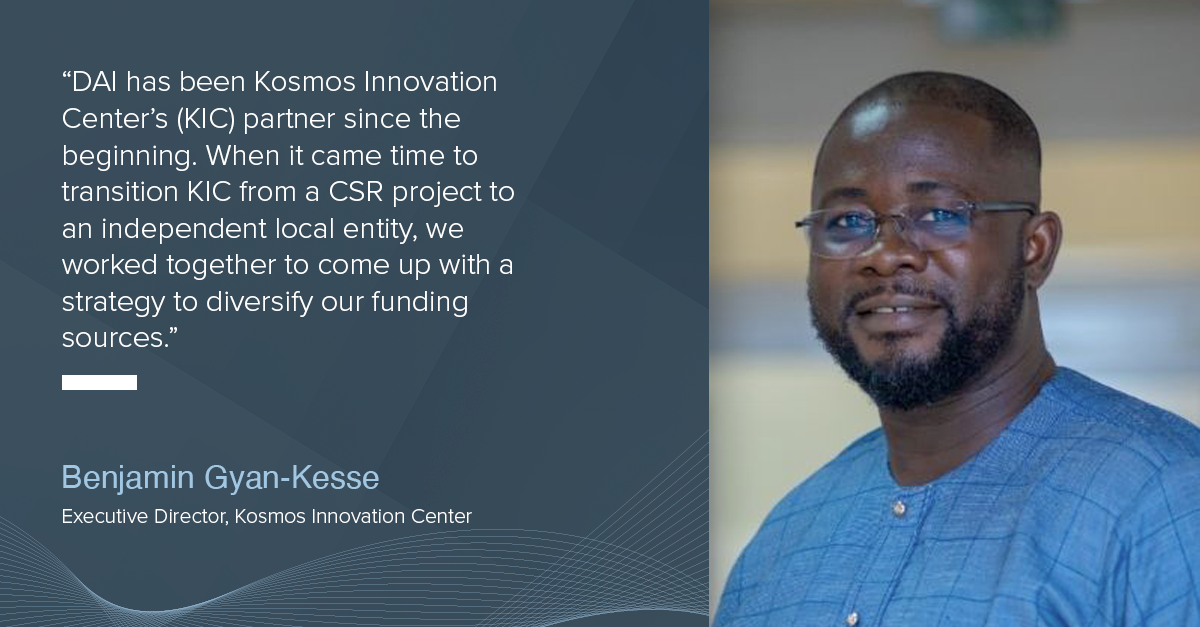A strong local ecosystem of incubators, accelerators, and other entrepreneur support organizations (ESOs) is critical to supporting the long-term, sustainable growth of small businesses. Unfortunately, these organizations often launch with a one-time pot of funding and then find themselves struggling after a few years to secure reliable sources of revenue. As a result, some incubators and accelerators end up failing to keep pace with local demand from entrepreneurs, sacrificing the quality of services, or even shutting down. This can lead to a confusing landscape where entrepreneurs and funders alike are not sure which organizations to trust or rely on for the long term.
Innovation ecosystem builders such as international donors, foundations, and governments, therefore, have an interest in helping incubators and accelerators become financially sustainable. Corporations are increasingly entering the space as well through their entrepreneurship support activities and are looking to form impactful relationships with local partners. Based on many years of DAI work with ESOs in emerging markets to develop strategies for organizational sustainability—from innovating business models to strengthening internal systems—we offer the following recommendations.
Diversify Funding Sources
In their efforts to develop sustainable business models, ESOs should consider a mix of grants, sponsorships, fees, and service provisions. Funding models for incubators and accelerators differ somewhat, but generally speaking, incubators are much more likely to succeed when supported by multiple streams of public and private sector funding. Similarly, most accelerators (60 percent globally) rely on two or more sources of funding.

The Kosmos Innovation Centre (KIC) in Ghana, which empowers young entrepreneurs to innovate within the country’s agriculture sector, has succeeded in becoming a sustainable program by diversifying its sources of funding. Executive Director Benjamin Gyan-Kesse told us that despite recently receiving a large grant, KIC does not have the luxury of waiting for it to run out before looking for new funding sources. “We have to start now. And that takes investment. In fact, we have hired two full-time staff that are dedicated to business development who have expertise in marketing, sales, strategy, and client engagement.”
Avoid Reliance on Grants and Consider Corporate Sponsorships
Grants usually play a larger role during an ESO’s start-up phase but they should not be the only mechanism for support. After the initial phase, grants are typically intended for specific short-term purposes and are difficult to turn into permanent revenue streams. Grants also come with risks and costs. They require significant labor investment upfront to identify opportunities and develop applications as well as investment in financial and impact reporting systems.
On the other hand, sponsorships from corporates or government entities are easier to implement as they are usually agreed in exchange for branding opportunities and visibility. They still require an upfront investment in networking, pitching, and negotiating with potential sponsors, often for relatively small sums, but the benefit in terms of diversification is worth the effort.
Leverage Expertise for Paid Services
ESOs can package their program models and expertise—including their tools, consulting skills, or professional services around business development and innovation—as paid services to customers. ESO staff are experts in advising and coaching small businesses and can also provide those services to innovation departments of large companies, universities, or government entities.
In addition, many accelerators worldwide take an equity stake in the firms they work with and seek returns on their investments as a source of income, though this approach is less common in developing countries where exits generally remain elusive (with notable exceptions).
Some ESOs pursue “earned revenues” such as charging startups rent or fees for program participation. For instance, by charging rent for a co-working space, ESOs can provide an affordable alternative to renting traditional office space. Some ESOs also house anchor tenants, such as innovation-focused teams from medium- or large-sized companies, which can be charged at a higher rate than startups.
Charging a fee for program participation will be difficult at first, as there are so many ESOs offering services free of charge. An accelerator working with more mature companies that have proven results and a recognizable brand is more likely to be successful charging fees.
Strengthen Internal Systems
Funders tend to prefer funding for specific programs rather than to cover overhead costs. However, ESOs need stable financial and operating systems to achieve long-term viability. Innovation ecosystem builders should invest in building a cadre of strong, sustainable ESOs in each market that can be a stable source of services and support to entrepreneurs over time.
For an ESO, building transparent systems takes time. Different clients and partners require different levels of fiduciary controls and policy documentation. When transitioning away from a single revenue source to a more complex revenue model, ESOs will require more rigorous accounting, operational, and HR systems that allow them to accurately track multiple revenue lines and client types. ESOs should align their systems with their growth strategy or risk investing valuable time and resources chasing funders that are unattainable because the basic internal system requirements cannot be met.
ESOs in any market should ensure that they are aware of the internal systems required to report on any mandated requirements set forth by the government. By aligning their systems development with their business development and growth goals, an ESO will be one step ahead in building long-term sustainability.







